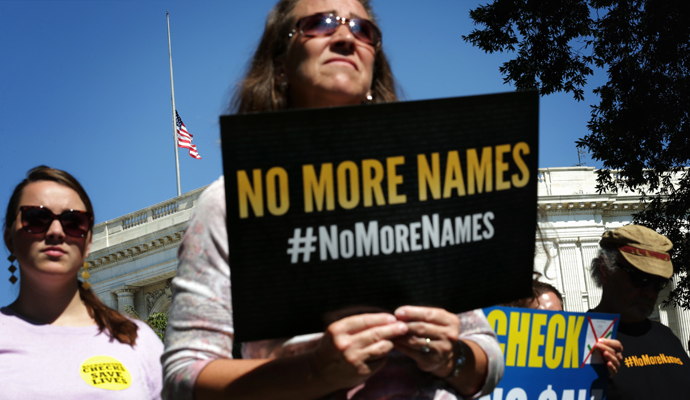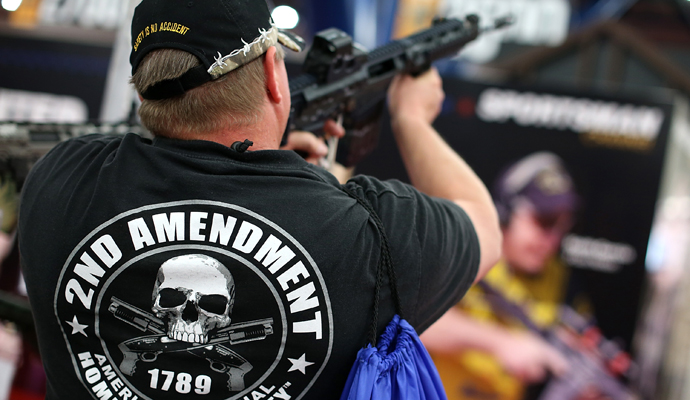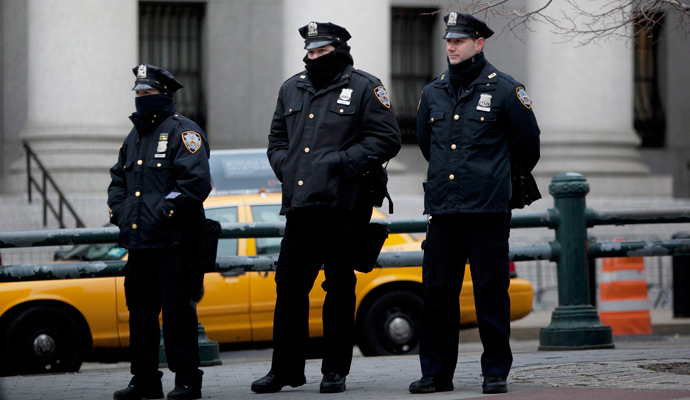Both sides are wrong on the gun debate. Here's why.
The situation is vastly more complex than partisans claim


A free daily email with the biggest news stories of the day – and the best features from TheWeek.com
You are now subscribed
Your newsletter sign-up was successful
In the wake of several fatal shootings that have once again unnerved Americans, partisans on both sides are trotting out the same tired narratives. Liberals declare that if only we regulated and banned guns like Europe does, there wouldn't be any more gun violence. Conservatives insist that the solution to gun violence is more guns, and just more guns.
Both of these narratives fail to take into account inconvenient facts, and in the end, both sides are wrong. Here are five critical facts that greatly inconvenience the simple narratives they are peddling.
1. The Second Amendment doesn't say what you think it does
The Week
Escape your echo chamber. Get the facts behind the news, plus analysis from multiple perspectives.

Sign up for The Week's Free Newsletters
From our morning news briefing to a weekly Good News Newsletter, get the best of The Week delivered directly to your inbox.
From our morning news briefing to a weekly Good News Newsletter, get the best of The Week delivered directly to your inbox.
The Second Amendment of the U.S. Constitution reads, "A well regulated militia, being necessary to the security of a free State, the right of the People to keep and bear arms shall not be infringed." To liberals, this means that the right to keep and bear arms is only connected to service in a militia, and is not a universal individual right. To conservatives, the Militia Clause is essentially decoration (a "prefatory clause," in the words of Justice Antonin Scalia's majority opinion in the landmark case DC v. Heller) and doesn't affect the heart of the matter: everyone under the U.S. Constitution has an individual right to bear arms. The conservatives have more of a case, because the Second Amendment was directly influenced by a similar provision in the English Bill of Rights, which protected an individual right to bear arms.
Still, they're both wrong in important ways. To liberals, the Militia Clause doesn't refer to a militia, but the Militia (singular). But in the early United States, the Militia did not refer to any specific organization; instead, it referred to the whole of able-bodied men. The Constitution does not refer to a standing Army, but rather to Congress' power to raise an Army — where from? From the Militia, i.e. all able-bodied men who, being already armed, were ready and willing to fight to defend the United States.
In other words, the situation envisioned by the Second Amendment is, contra the liberals, one where most everyone owns guns. But, contra the conservatives, the founders envisioned a society where gun ownership is connected to certain service obligations. Imagine a situation more like Switzerland — the other rich country with widespread private gun ownership but where, because everyone is required to undergo regular training and secure their weapons and so on, gun violence is very low.
Suffice it to say, an agreement along those lines — with an individual right to bear arms, but stringent training and safety requirements — is not on the cards politically in the U.S., and has something to drive each side insane. Yet that's what the Second Amendment envisions.
A free daily email with the biggest news stories of the day – and the best features from TheWeek.com
2. There are hundreds of millions of guns in America

(Alex Wong/Getty Images)
Most promoters of stringent gun regulations want to bring the U.S. more in line with most of Europe and Japan, where guns are severely restricted, most people don't have guns, and everything is fine. Liberals constantly point to the fact that levels of gun violence are much, much lower practically everywhere outside of America's borders.
Here's the biggest problem with that: There already are hundreds of millions of guns in the U.S. If you could wave a magic wand and get rid of all privately owned guns, and set up a European-style system, putting aside moral questions related to the desirability of a right to bear arms, would there be a lot less gun violence? Probably, yes. But in the real world, there are no magic wands. Short of establishing a totalitarian police state (insert your own joke here, libertarians), there is no feasible way to make America a non-gun-saturated country. Whether or not it is theoretically desirable that there not be hundreds of millions of guns circulating in America, it is simply not the world we live in. Any credible gun-related policy needs to take into account this inconvenient, stubborn fact.
3. We don't have a cure for mental illness
In a country where we can't magically wave a wand and make hundreds of millions of guns vanish overnight, a big reason for the depressingly common occurrence of mass shootings is mental illness. The simple fact of the matter is that we — collectively as a society — know very little about mental illness. We know very little about what causes it, how to detect it, how to prevent it, how to cure it, and so on. Closing the so-called "gun show loophole," which lets people buy guns without background checks, sounds like a good idea. But in America, a determined crazy person will find a way to get their hands on guns.
There are many small-bore initiatives that could to be tried; if anything, we should experiment as much as we can with various local initiatives all over the country, and especially try them out as randomized experiments. But we should also keep our expectations rational and realistic. Mental illness will always be with us, this side of the ObamaCare soma mandate, at least.
4. People have a right to self-defense

(Justin Sullivan/Getty Images)
When conservatives respond to a mass shooting by claiming that if only someone there had a gun the shooting wouldn't have happened, liberals either scoff or become apoplectic.
Of course, conservatives wildly overstate their case: no, K-12 teachers should not be packing heat. Still, law-abiding citizens use guns to save lives. As Jeffrey Goldberg noted in 2007, at least one law-abiding gun-carrying citizen stopped a massacre, and concealed-carry permit holders commit crimes at a lower rate than the general population and perhaps even at a lower rate than the police. The vast, vast majority of law-abiding gun owners pose no danger to anyone.
Every human being has a natural, personal right to self-defense. I don't know of any moral system that doesn't hold this to be true. In non-gun-saturated countries, the government can restrict legal gun ownership to a great extent without unduly restricting the natural right to self defense, because it is vanishingly unlikely that someone will have to defend themselves against a gun-wielding attacker.
The United States, however, is a gun-saturated country. However much we may wish that it were not the case, guns circulate widely in the United States. There are millions of illegal guns in circulation, and this will remain so for the foreseeable future. Crime happens. And people have a natural right to self-defense. Given all those facts, it is hard to see how it is possible to severely restrict the rights of law-abiding citizens to own guns without also unacceptably restricting human rights as they are understood in the Enlightenment tradition in general, and in the Anglo-American Constitutional tradition in particular.
5. There is one good way to get rid of guns, and liberals hate it

(Allison Joyce/Getty Images)
You'll have noted that many of the grim evaluations I've laid out are based on one premise: that the United States is, and for any foreseeable future will remain, a gun-saturated country. But there is one jurisdiction that has led a largely successful campaign to become what liberals want — a largely gun-free polity — but it has done so through means that liberals loudly revile. I am talking, of course, of New York City under Mayor Bloomberg and of the practice known as stop-and-frisk.
Any policy dedicated to getting rid of illegal guns will end up with police targeting areas where crime is more common. And the sad truth in America is that such areas are largely poor and populated by minorities. If you want to get rid of illegal guns in a neighborhood, given that a gun is a very small and easy-to-conceal item, there are no two ways to go about it effectively: you have to search very large amounts of people, in a systematic, sustained way. As John Podhoretz has argued, it is the very comprehensiveness of stop-and-frisk that makes it effective: it's once you know that your likelihood of being searched is very high that you don't dare venture out with an illegal gun. And given the social reality of the United States, most of the people targeted will be young minorities. That this is deplorable doesn't make it any less real.
This state of affairs may point to some hypocrisy on the part of some conservatives, some of whom might perhaps like stop-and-frisk and a gun in every middle-class home. But it also leaves liberals in a moral bind. For liberals, stop-and-frisk clearly isn't about empirical costs and benefits; the liberal discourse on stop-and-frisk is that it is comprehensively wrong because it fails to protect a civil right that they particularly care about, rightly, namely the Fourth Amendment, and the fact that stop-and-frisk disproportionately targets minorities is the terrible icing on the awful cake. This is an honorable position. It is also a position that, given the reality of American society, precludes any serious effort at "solving the gun problem." Again: I am not saying that this is something I am happy about. But facts really are stubborn.
What, then, can we do about guns? Well, the first step is to have humility. Humility to recognize the facts as they actually exist, and humility to recognize that there is no magic wand that will stop every bullet. Second, there are, indeed, practical steps to take, such as closing the biggest loopholes in gun laws, and embarking on a significant, but realistic, endeavor to experiment locally and incrementally with initiatives to combat mental illness. But embarking on these practical steps entails having the humility to recognize that the utopian (or, perhaps, dystopian, in the light of stop-and-frisk) vision of a gun-free America just isn't going to happen. And third, most importantly and most difficultly, Americans should evolve their culture toward a greater recognition, as the original vision of the Second Amendment and the example of Switzerland point us to, that gun ownership is a right, yes, but also a responsibility. But this humble recognition is hampered by the fact-free, boasting utopianism of both sides screeching through this so-called debate.
Pascal-Emmanuel Gobry is a writer and fellow at the Ethics and Public Policy Center. His writing has appeared at Forbes, The Atlantic, First Things, Commentary Magazine, The Daily Beast, The Federalist, Quartz, and other places. He lives in Paris with his beloved wife and daughter.
-
 The Olympic timekeepers keeping the Games on track
The Olympic timekeepers keeping the Games on trackUnder the Radar Swiss watchmaking giant Omega has been at the finish line of every Olympic Games for nearly 100 years
-
 Will increasing tensions with Iran boil over into war?
Will increasing tensions with Iran boil over into war?Today’s Big Question President Donald Trump has recently been threatening the country
-
 Corruption: The spy sheikh and the president
Corruption: The spy sheikh and the presidentFeature Trump is at the center of another scandal
